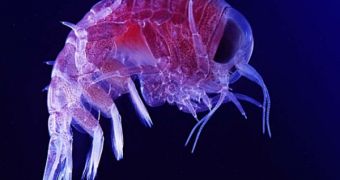Marine biologists, studying the way plankton orients itself towards the light, discovered what is believed to be the first stage in the evolution of eyes as we know them. While eyes in the animal kingdom are very complex and benefit from an intricate network of neurons, ready to carry out their electrical signals, the eyes microscopic creatures that form the plankton have are infinitely less complex.
Phototaxis is the main catalyst that promotes life in the oceans, scientists say. It represents the ability that animals making up the plankton have, of orienting themselves towards the sun, so as to be able to process as much sunlight as possible. This ability allows them to grow and move, which means that other marine animals can consume them. In fact, plankton is consumed in the tons by whales each day.
But how do these microscopic organisms see, researchers ask? Previous research showed that most of them only had a photoreceptor cell and a pigment cell, which made up the entire visual apparatus. Interactions between the two determined movement in the tiny creatures. Their bodies were lined with cilia, hair-thin "limbs," that allowed them to displace water and move towards the sun.
"Platynereis can be considered a living fossil. It still lives in the same environment as its ancestors millions of years ago and has preserved many ancestral features. Studying the eyespots of its larva is probably the closest we can get to figuring out what eyes looked like when they first evolved," argued Gaspar Jekely, who worked with the European Molecular Biology Laboratory, which conducted the new research.
Having identified the precursors of "modern" eyes, researchers will now attempt to discover exactly how and why these organs developed to such high levels of complexity. It's true, Charles Darwin did say that it was evolution's way of adapting terrestrial creatures to their new environment, but how this happened will most likely remain a mystery for a very long time.

 14 DAY TRIAL //
14 DAY TRIAL //